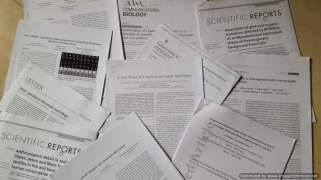The disastrous effects of a changing climate – famine, floods, fires and extreme heat – threaten our very existence.
https://www.un.org/en/content/common-agenda-report/summary.shtml
This quote, from the very first page of the United Nations Common Agenda Report Summary, is wrong. Yes, there is a very real threat – but it isn’t a threat to the “very existence” of humanity. It is highly unlikely that climate change will cause such widespread death in the human population to reduce the 7,953,952,577 or so individuals now alive down to the 500 or so that would be necessary to repopulate the Earth.
What is threatened? The way of life enjoyed by the wealthy people who live in the richest nations on the planet. Yes, the poor are likely to die first under the influence of climate degradation. The wealthy will be able to move inland, to higher ground, or further from the Equator. They will be able to buy expensive food and build fire resistant, air conditioned homes. Yes, quality of life is likely to decline even for the rich. But no, climate change is not going to wipe out the human race. A comet strike? That could do it. Huge solar flares? Possibly. Global nuclear war? We might not survive that. But climate warming due to human activity? This is a self-regulating problem.
Why is climate change self-regulating? Because, as changing climate conditions kills off our excessive population, poorest first, it will also decrease the industrial activity that causes it. Humans will lose the technical capacity to keep pumping carbon and other pollutants into the atmosphere. Without such interference the planet will reach equilibrium again. Overall mean temperatures may be hotter than the previous they have been in more than 100,000 years but, as a species, we are likely to adapt.
The last time the Earth was this warm was 125,000 years ago
https://www.usatoday.com/story/weather/2017/01/18/hottest-year-on-record/96713338/
Modern humans have been around at least 196,000 years and maybe as much as 300,000 years. (https://en.wikipedia.org/wiki/Early_modern_human). They have lived through major climate changes that they did not cause. Some of us more modern people will too.
I’m not suggesting that there is nothing to worry about. The possibility of knocking human progress back to the stone age is no laughing matter. The likelihood of a global population collapse as cultures struggle to adapt to warmer and more volatile weather is not fun to contemplate. But does exaggerating the consequences of climate change help or hinder the popular crusade to halt human impact on planet-wide weather? By suggesting that the human race will not survive we make it easier to dismiss the whole issue.
IMHO, overstating the consequences of climate change empowers climate change deniers.


















 Many of us who read research literature may notice that research is a very “trendy” business. For example, the areas of “personalized learning” and “individualized instruction” became very popular for about 10 years between the late 1990s and the early 2010s. Subsequently this subject has faded away and few papers address the topic. Why?
Many of us who read research literature may notice that research is a very “trendy” business. For example, the areas of “personalized learning” and “individualized instruction” became very popular for about 10 years between the late 1990s and the early 2010s. Subsequently this subject has faded away and few papers address the topic. Why?
Calling all climate change spokespeople
As a systems thinker, I am concerned that most messaging about climate change and sustainability is too simplistic to promote useful individual action – simplistic and short sighted. The biggest problem is that we leave human population growth out of the equation.
We urge people to make changes in their daily activities as if that will be sufficient to arrest anthropocentric climate effects. We fail to point out that even if they live more simply and burn fewer fossil fuels, our bloated population will still spend the Earth’s natural capital at a rate that exceeds the ecosystem’s ability to replenish itself. We need both population control/decrease and reduced per capita consumption to erase the human impact on global climate.
Reducing consumption is harder than it looks at first glance. Take plastic bags, for example. Plastic bags and containers are very convenient and, given the extensive development of the petroleum industry, inexpensive. Companies like the one shown here advocate buying new but reusable plastic products as a pathway to reducing consumption. This allows people to feel virtuous without seriously impacting the problem.
Here’s another example. The reason for the collapse of the cliff underneath this road may be either natural or human initiated climate change. But we consider it to be a disaster because of the inconvenience and expense to humans. If there we fewer of us, or if we were not in so much of a hurry, we humans would simply walk around the slide area.
I understand that these are complex ideas which are difficult to craft into short sound bites. But the problem is complex. I hope you will agree with me that these messages are important.
Share this:
Like this:
Leave a Comment
Filed under Climate Change Commentary, Media
Tagged as climate, climate change, population, sustainability